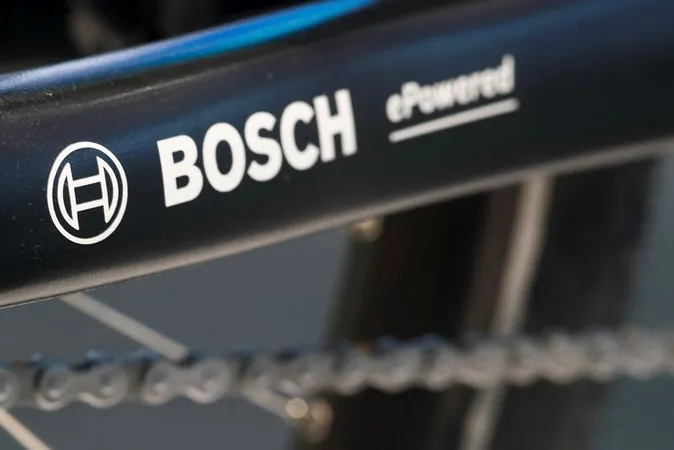
Bosch's Job Cuts Signal Deepening Crisis in Germany's Auto Industry
2024-11-22
Author: Chun
Bosch's Job Cuts: An Overview
In a striking move that underscores the ongoing crisis in Germany's automotive sector, Bosch, the world's leading car parts supplier, announced plans to eliminate up to 5,550 jobs in the coming years. This decision highlights the increasing pressure the industry faces from cheaper competition, particularly from Chinese manufacturers, combined with declining demand for innovative automotive technologies.
Details of the Job Cuts
Bosch will eliminate approximately 3,500 roles within its cross-domain computer solutions division by the end of 2027. Notably, around half of these job cuts will occur at facilities in Germany. This division has been struggling with a lack of demand for advanced driver assistance systems and automated driving solutions, which had previously been seen as the future of vehicle technology.
In addition to these cuts, Bosch’s Hildesheim plant in Germany will see a reduction of around 750 jobs, with 600 of these positions slated to be cut by the end of 2026. Furthermore, significant changes are also on the horizon for the company’s steering division at its plant in Schwaebisch Gmuend, near Stuttgart, where Bosch plans to make up to 1,300 job cuts between 2027 and 2030.
Impact on the Automotive Industry
The repercussions of these layoffs extend beyond Bosch; the entire German automotive landscape is feeling the strain. Major automakers like Volkswagen and Mercedes-Benz are also grappling with similar challenges. Volkswagen has faced backlash from employees over plant closures in Germany, while Mercedes struggles with declining earnings, prompting calls for rigorous cost-cutting measures.
Workers' Response and Future Considerations
The announcement has sparked strong opposition from Bosch's works council and the IG Metall union. They have vowed to organize resistance against the planned job cuts. Frank Sell, deputy head of the works council, stated, "We will now organize our resistance to these plans at all levels," indicating a firm commitment to fighting for the workforce.
As the auto industry in Germany continues to battle the dual threats of intense international competition and declining domestic demand, the future of thousands of jobs hangs in the balance. Bosch’s dramatic decision raises critical questions about the long-term viability of traditional automotive manufacturing in the region and the potential need for a strategic shift towards more sustainable and innovative technologies. The situation remains fluid, with further developments expected as both companies and workers grapple with the challenges ahead.

 Brasil (PT)
Brasil (PT)
 Canada (EN)
Canada (EN)
 Chile (ES)
Chile (ES)
 España (ES)
España (ES)
 France (FR)
France (FR)
 Hong Kong (EN)
Hong Kong (EN)
 Italia (IT)
Italia (IT)
 日本 (JA)
日本 (JA)
 Magyarország (HU)
Magyarország (HU)
 Norge (NO)
Norge (NO)
 Polska (PL)
Polska (PL)
 Schweiz (DE)
Schweiz (DE)
 Singapore (EN)
Singapore (EN)
 Sverige (SV)
Sverige (SV)
 Suomi (FI)
Suomi (FI)
 Türkiye (TR)
Türkiye (TR)